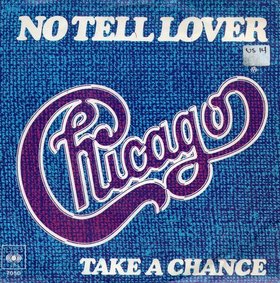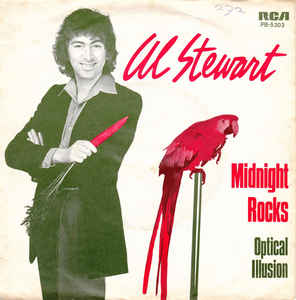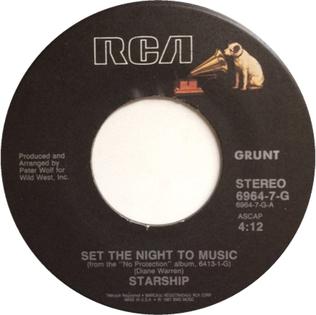
Change of Heart is a 1978 album by Eric Carmen. It was his third solo LP, and reached #137 on the Billboard album chart.

French Kiss is the solo debut by former Fleetwood Mac singer/guitarist Bob Welch. The songs, with the exception of "Sentimental Lady", were intended for a projected third album by Welch's previous band, Paris. However, the group fell apart in 1977 before recording could begin. So instead, Welch used these songs for his debut solo album.

"No Tell Lover" is a song written by Peter Cetera, Lee Loughnane, and Danny Seraphine for the group Chicago and recorded for their album Hot Streets (1978), with Cetera and Donnie Dacus singing lead vocals. The second single released from that album, it reached No. 14 on the U.S. Billboard Hot 100 chart and No. 5 on the adult contemporary chart.

"The Boss" is a 1979 song written and produced by Ashford & Simpson and recorded by singer Diana Ross, who released it as a single on the Motown label. It was the first release from the album of the same title (1979). The song was released on May 22, 1979, a day before the album release.

"A Beautiful Morning" is a song written by Felix Cavaliere and Eddie Brigati and recorded by the Rascals. Coming out in early 1968, it was the group's first single released under that name rather than the Young Rascals. The single was one of the earliest released in stereo, as 7-inch singles generally were in mono. Together with the Doors "Hello, I Love You" it's credited with changing the industry standard of singles.

"Don't Ask Me Why" is a Billy Joel song released in 1980. The track contains all acoustic and Latin percussion instruments performing in an Afro-Cuban rhythmic style. An eclectic, instrumental "Latin Ballroom" piano solo, played over the bridge section after the second verse, is also featured in part of the song; Joel states that the mix for the midsection includes "fifteen pianos overdubbed on top of each other." The song spent two weeks at number one on the Adult Contemporary chart and peaked at number 19 on the Billboard Hot 100.

Goin' Coconuts is a 1978 American musical adventure comedy film directed by Howard Morris and starring Donny and Marie Osmond. The feature film was released in theaters on October 18, 1978. It was both a critical and commercial failure. Shooting took place in Oahu, Hawaii from March 31 to May 1978, during the annual production hiatus for the Osmonds' variety TV series. It was Ted Cassidy's final film appearance before his death in January 1979.

"I'll Be Good to You" is a 1976 hit song by R&B duo the Brothers Johnson. George Johnson, one of the two Johnson brothers in the band, wrote the song after deciding to commit to a relationship with one woman, instead of dating several at a time. While George was recording a demo for the song, family friend Senora Sam came by and added some lyrics. Brothers Johnson producer and mentor Quincy Jones heard the song, liked it, and convinced George to sing lead on the finished track. Released from their debut album, Look Out for #1, it was a top-ten hit on the Billboard Hot Singles Charts, peaking at number three, and a number one song on the Billboard R&B Charts during the summer of 1976. The single was later certified gold by the RIAA.

Set the Night to Music is an album released by Roberta Flack in 1991 on Atlantic Records. The title track, written by Diane Warren and originally the 11th track of Starship's 1987 album No Protection, was remade as a duet with Maxi Priest and reached number 6 on the Billboard Hot 100 and number 2 on the Hot Adult Contemporary chart. In Canada, "Set the Night to Music" peaked at number nine on the pop singles chart and number one on the Adult Contemporary chart. It became the 17th biggest Canadian Adult Contemporary hit of 1991.
"You Take My Breath Away" is the 1979 debut single by singer-actor Rex Smith and the first release from his third studio album Sooner or Later which is also featured in the 1979 made-for-television film of the same title starring Smith and Denise Miller. It was produced by Charles Calello and Stephen Lawrence, and written by Lawrence and Bruce Hart.
Turn Your Radio On is Ray Stevens' eighth studio album and his third for Barnaby Records, released in 1972. The title comes from a gospel song written by Albert E. Brumley. Unlike Stevens' previous album releases, this album shows Stevens' spiritual side and was his first album of gospel music. The fourth track, "Let Your Love Be a Light unto the People", was written by Stevens' brother, John Ragsdale. The sixth track, "Have a Little Talk with Myself", was taken from Stevens' album of the same name. The album includes four singles, three of which were issued before the album's release: "A Mama and a Papa", the traditional gospel song "All My Trials", the title track, and "Love Lifted Me".

"1, 2, 3, Red Light" is a song written by Sal Trimachi and Bobbi Trimachi and was recorded by 1910 Fruitgum Company for their 1968 album, 1, 2, 3, Red Light. The song charted highest in Canada, going to number 1 on the RPM 100 national singles chart in 1968. In the same year in the US, it went to number 5 on the Billboard Hot 100 and was on the charts for 13 weeks.

"You Can Make History " is a song by Elton John, initially recorded in 1996 and released on the American version of the compilation Love Songs. As the song was recorded after the release of the original European version of the compilation, it was not included on that version.

"Midnight Rocks" is a song written by Al Stewart and Peter White and was performed by Stewart. The song appeared on his 1980 album, 24 Carrots.

"Vienna Calling" is a song recorded by Austrian musician Falco, released in September 1985 as the second single for his third studio album Falco 3 (1985) and in 1986 in Anglophone markets.

"Sweet Mary" is a song written by Steve Jablecki and performed by Wadsworth Mansion. "Sweet Mary" was featured on their 1971 album Wadsworth Mansion. The song was produced by Jim Calvert and Norman Marzano.
The discography of Australian rock band The Easybeats.

"Set the Night to Music" is a song written by Diane Warren and recorded by Starship on their LP, No Protection (1987). It became a major hit for Roberta Flack in 1991. Starship's original version became a Top 10 hit on the U.S. Billboard Adult Contemporary chart, reaching number nine in the spring of 1988, and also charted minorly in Canada. The song appeared at the end credits of the 1988 fantasy-comedy film Vice Versa starring Judge Reinhold and Fred Savage

No Refuge is the second studio album by singer Eddie Schwartz. It was released in late 1981 by A&M Records in Canada, and appeared on Atco in the US in early 1982.

"If You Don't Want My Love" is a song by Robert John from 1968. It became a hit in the U.S. and the UK (#42). It did best in Canada, where it reached #21.


















